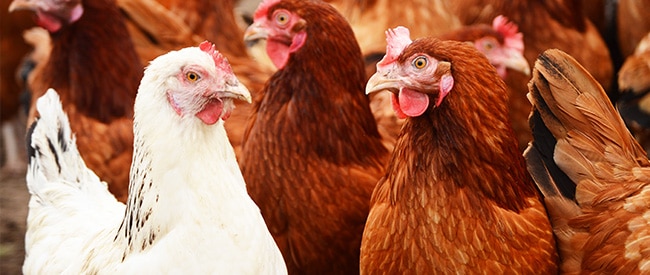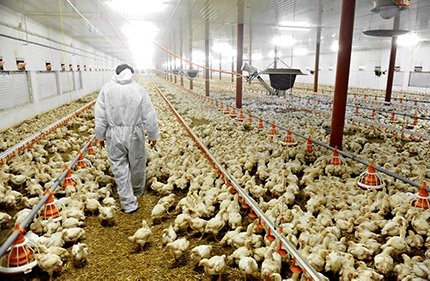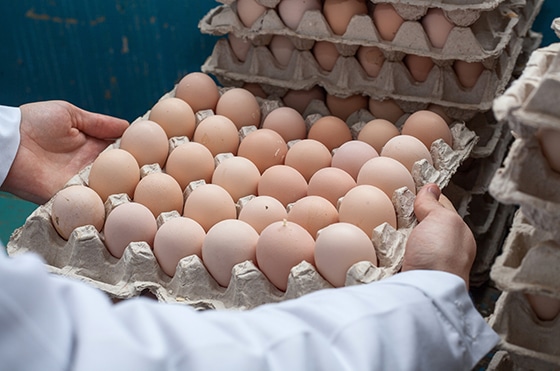The Poultry Life Cycle on a Farm

Chicken and chicken eggs are two of the most popular protein sources in Canada but that’s not the only kind of poultry produced by farmers. Turkey, duck, quail, silkies, and pheasants are also grown and processed for consumption. The poultry farming industry is large and composed of many organizations working together along the supply chain to ensure safe and quality food is produced. MFI is proud to be a small part of the industry by supporting poultry farmers with insurance coverage. Read on for details on the life cycle of a broiler chicken and some of the farm insurance coverages that can support a poultry farm in the event of a loss.
At the Beginning: Eggs
Broiler chickens start their life on specialized broiler hatching farms. These farms produce fertilized eggs that become baby chicks. Farmers carefully plan the heritage of baby chicks to ensure genetic diversity and to strengthen the flock. Eggs are collected from laying hens and sent to a special hatchery for 21 days. After the first day of life, chicks are sold to a poultry producer—a farmer who raises chicks until they are ready for human consumption.
On the Broiler Farm
 Chicks are delivered to a clean barn with fresh wood shavings or straw on the floor, also called litter. The barns are designed to provide chicks with the optimal environment; many aspects are taken into consideration to ensure the best health for the birds including temperature, humidity, ventilation, feed, and water.
Chicks are delivered to a clean barn with fresh wood shavings or straw on the floor, also called litter. The barns are designed to provide chicks with the optimal environment; many aspects are taken into consideration to ensure the best health for the birds including temperature, humidity, ventilation, feed, and water.
Chickens are very sensitive to heat; they do not have sweat glands like humans do. So, farmers have sensitive thermometers and humidity gauges in barns to ensure birds are comfortable during the growing cycle. To further help control heat and humidity, barns use specialized ventilation systems to push out any ammonia and carbon dioxide and bring in fresh oxygen.
Food and fresh water are delivered to birds through feed lines and water lines. The lines can be raised as chicks grow into adult birds ensuring they are at a comfortable height.
Biosecurity, the process of preventing harmful pathogens from entering the barn, is an essential aspect of raising broilers in Canada. Farmers follow strict protocols for both conventional and free-run farms like having barn-specific footwear and clothes when entering the barn to inspect the flock. Biosecurity procedures are vital for keeping chickens healthy! All of these procedures and more are recorded with precision so that information can be referenced in the future.
- All visitors sign in and out when accessing the barn like veterinarians and maintenance workers
- The amount of feed eaten, and water drank by the flock is recorded to ensure the flock is healthy and order supplies as necessary
- Maintenance of electrical work and farm machinery is noted
To the Dinner Table
At the end of the growing period (about 8 weeks), fully grown broiler chickens are sold and transported in specially designed trucks to a processing facility. The Canadian Food Inspection Agency ensures that proper protocols are followed by processors at all times. Once processed, the meat is ready to go to grocery stores and restaurants or for further processing into pre-packaged goods.
What about eggs?
Fried, soft-boiled, poached. Baked into cakes. Added to cocktails. Chicken eggs find their way into many dishes, but did you know producing eggs for consumption is completely separate from producing meat?
Generally, after hatching, birds are brought to a pullet barn to grow and mature. Next, hens are moved to a laying barn. There are several regulated barn systems in Canada:
- Conventional housing where birds are in small group settings with a curtained area to lay eggs. This type of barn is the most common in Canada.
- Enriched colony housing keeps birds in small group settings with a scratch pad, perch, and private nest box for each group.
- Free-run housing allows hens to roam the entire barn but do not have access outside.
- Free-range housing means hens are raised in a barn with access to outdoor space when weather permits.
- Aviary housing provides hens access to the entire barn with a multi-leveled structure for them to explore, feed, drink, perch, and lay eggs. This barn style is very new to Canada.
 Hens are fed a balanced and nutritious diet with fresh water easily accessible in all barn systems. It is a farmer’s top priority to keep hens in the best health.
Hens are fed a balanced and nutritious diet with fresh water easily accessible in all barn systems. It is a farmer’s top priority to keep hens in the best health.
Eggs are collected from the barns and sent to a grading station to be washed and graded based on size and quality. Eggs fall into size ranges by weight; they can be classified as jumbo, extra-large, large, medium, small, or pee wee eggs. Then eggs are packed into cartons, dated, and stored in a cooler. Some eggs will wait to be shipped to a grocery store and some will ship to another facility that may produce liquid eggs, dried eggs, or food products like pasta, ice cream, and mayonnaise.
Farm Insurance
Poultry farming is a complex process that provides exceptional meat and eggs for grocery stores and restaurants across the country. Insurance companies also play a part helping poultry farmers by providing insurance coverage for their farms. Together with an insurance broker, farmers may consider the following coverages for a commercial poultry farm:
- Farm Livestock
- Farm Livestock – Electrical Breakdown & Mechanical Breakdown
- Farm Livestock – Heat Prostration
- Farm Stock – this coverage can help protect eggs while stored and waiting to be transported and also while in transit.
- Grain Bins and Silos
- Marketing Board Buyup Protect – coverage helps egg farmers meet new marketing board bylaw standards by offering additional coverage for the increased costs to construct a barn in the event of a loss.
- Poultry Disease Clean-Up Costs – provides coverage to depopulate, remove, and disinfect a barn in response to a specified disease outbreak.
- Farm Equipment Breakdown
Looking for More Information?
Check out these Canadian associations for more information about poultry farming.

